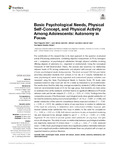Mostrar o rexistro simple do ítem
Basic Psychological Needs, Physical Self-Concept, and Physical Activity Among Adolescents: Autonomy in Focus
| dc.contributor.author | Fraguela-Vale, Raúl | |
| dc.contributor.author | Varela Garrote, Lara | |
| dc.contributor.author | Carretero, Miriam | |
| dc.contributor.author | Peralbo-Rubio, Eva María | |
| dc.date.accessioned | 2020-04-22T11:37:15Z | |
| dc.date.available | 2020-04-22T11:37:15Z | |
| dc.date.issued | 2020 | |
| dc.identifier.citation | Fraguela-Vale R, Varela-Garrote L, Carretero-García M and Peralbo-Rubio EM (2020) Basic Psychological Needs, Physical Self-Concept, and Physical Activity Among Adolescents: Autonomy in Focus. Front. Psychol. 11:491. doi: 10.3389/fpsyg.2020.00491 | es_ES |
| dc.identifier.uri | http://hdl.handle.net/2183/25395 | |
| dc.description.abstract | [Abstract] The contribution of this research lies in its dual approach to the question of physical activity (PA) among adolescents, combining objective measurement of PA by teenagers and a comparison of psychological satisfaction through physical activities involving differing degrees of autonomy (i.e., organized or unstructured). Using the conceptual framework of Self-Determination Theory, the analysis also examines the relationship between levels of PA among adolescents and physical self-concept and satisfaction of basic psychological needs during exercise. The study surveyed 129 first-year higher secondary education students from schools in the city of A Coruña. Satisfaction of basic psychological needs during organized and unstructured physical activities was measured using the Basic Psychological Needs in Exercise Scale. PA levels were assessed based on step count per day for a week as measured by an accelerometer. The results show that the daily step average recorded by students (7,400) is below the minimum recommended levels of PA for this age group, that students are more active on weekdays than at the weekend, and that there is no significant difference in PA levels between male and female subjects (T = 0.23, p < 0.05, d = 0.04). Findings from the comparative analysis of the three basic psychological needs show greater satisfaction of the need for autonomy during unstructured activities (T = 6.15, p < 0.001, d = 0.68), and greater satisfaction of the need for competence during organized activities (T = −2.50, p < 0.05, d = 0.27). No variation in terms of sex was found in relation to satisfaction of the need for autonomy or relatedness from unstructured activities; however, girls showed notably lower satisfaction than boys in relation to the need for competence (T = −2.62, p < 0.01, d = 0.49). Self-esteem was found to play an important mediating role and observed to be strongly related to sex (T = −5.16, p < 0.001, d = 0.90). Organized PA was found to provide greater need satisfaction among boys than girls across all categories. The study showed no relationship between psychological variables and objectively measured PA (Pillai’s trace: F = 0.86, p > 0.05, η2 = 0.08, observed power = 0.66). Basic psychological needs show significant positive interrelation between them and a significant positive relationship between them and physical self-concept, as expected based on previous literature. | es_ES |
| dc.language.iso | eng | es_ES |
| dc.relation.uri | https://doi.org/10.3389/fpsyg.2020.00491 | es_ES |
| dc.rights | Atribución 4.0 Internacional | es_ES |
| dc.rights.uri | http://creativecommons.org/licenses/by/4.0/ | * |
| dc.subject | Basic psychological needs | es_ES |
| dc.subject | Physical self-concept | es_ES |
| dc.subject | Physical activity | es_ES |
| dc.subject | Autonomy | es_ES |
| dc.subject | Adolescence | es_ES |
| dc.subject | Selfdetermination theory | es_ES |
| dc.title | Basic Psychological Needs, Physical Self-Concept, and Physical Activity Among Adolescents: Autonomy in Focus | es_ES |
| dc.type | info:eu-repo/semantics/article | es_ES |
| dc.rights.access | info:eu-repo/semantics/openAccess | es_ES |
| UDC.journalTitle | Frontiers in psychology | es_ES |
| UDC.volume | 11 | es_ES |
| UDC.startPage | 1 | es_ES |
| UDC.endPage | 12 | es_ES |
| dc.identifier.doi | 10.3389/fpsyg.2020.00491 |
Ficheiros no ítem
Este ítem aparece na(s) seguinte(s) colección(s)
-
GI-PEHS - Artigos [32]






